- Home
- Kate DiCamillo
Beverly, Right Here Page 7
Beverly, Right Here Read online
Page 7
What I wanted to tell you is that if you don’t know to look for the words, you could miss them. You could end up not seeing them at all. The thing is that you have to turn your head just the right way.
Don’t worry. I’m going to tell you what the words are. There’s a lot I’m going to tell you. But first, I want to ask you a favor.
Could you go and visit Buddy’s grave?
Beverly wrote for a long time. She used both sides of the paper. She had to ask Iola for another piece, and she still wasn’t anywhere near done.
She sat in the crooked little kitchen by the crooked little sea and wrote and wrote.
You’re getting good at busing tables,” said Freddie. “You could even wait tables if you wanted. I mean you should think about it someday. At some different restaurant. Not here. Because I am the waitress here.”
“Yeah,” said Beverly. “I know.”
“What I mean is you should think about dreaming bigger. You should think in a multi-road way. I took a seminar about all of that once. It was called ‘Dream Big,’ and that was what they taught you. To dream big and drive on lots of roads and not to ever settle. And right after I took the seminar, I got the job as a Living Darlene, and I could see that my destiny was coming true.”
“What destiny?” said Beverly.
“The destiny of becoming famous,” said Freddie.
“Right,” said Beverly.
The two of them were in the dining room of Mr. C’s, rolling silverware up in napkins. Freddie was smoking a cigarette.
Beverly was sitting with her back to the ocean. She couldn’t see it and she couldn’t hear it, but she could feel it back there, heaving itself up and down, glittering.
“Jerome dreams big. I mean, he didn’t take the seminar or anything. He didn’t need to. He just kind of does it naturally. He’s going to be rich someday.”
“Good for him,” said Beverly.
“Jerome knows a lot,” said Freddie.
“I bet he does,” said Beverly.
“Look,” said Freddie. She tilted her head back and blew cigarette smoke up in the air above their heads. “You can be all snotty if you want to. What I’m saying is that you have to have a dream. If you want to get stuck here busing tables for the rest of your life, then go right ahead. Be my guest. You and broken Charles and grumpy old Doris and Mr. Fish Manager will be very happy together, I’m sure.”
Mr. Denby came walking toward them. He was smiling a big smile and wearing a tie with a green octopus on it. Beverly couldn’t tell for sure, but it looked like the octopus had nine legs.
“Freddie,” Mr. Denby said, still smiling, “do you think it’s a good idea to smoke as you roll the silverware?”
“Yes,” said Freddie. “I do.”
“I’ve been thinking,” said Mr. Denby. “What we need to do around here is smile more, all of us.”
“I smile a lot,” said Freddie.
“We’re in the hospitality business, after all,” said Mr. Denby.
“I thought we were in the fish business,” said Beverly.
“I’ve noticed that if you smile a lot, people will tip you more,” said Freddie. “Can I just point out that Doris and Charles don’t ever smile?”
“They’re not in the front of the house,” said Mr. Denby.
“And also,” said Freddie, “I guess they just don’t have that much to smile about.”
“Right,” said Mr. Denby. He ran his hand over his head. He smoothed down his octopus tie. He cleared his throat. “Yes,” he said. “Okay, well, I’m ready to open the door. Freddie, put out the cigarette and let’s start the show.”
“What show?” said Freddie.
“The fish show,” said Beverly. “Duh.”
At the end of her shift, Beverly was waiting for Mr. Denby in the office. She was sitting in the orange chair. The fan had disappeared. Two of the cabinet drawers were ajar. The paper piles on the desk looked bigger.
The safe door, as usual, was open.
Beverly stood up and walked over to the safe and looked inside. There were several piles of bundled-up twenties and lots of loose pieces of paper.
Beverly picked up a stack of twenties. She could take it. She could take it without even cracking the safe. It would be easy.
She put the money back.
And then she saw a photograph.
Its edges were curled.
Beverly picked it up.
The photograph was of Mr. Denby. He was wearing a Santa hat. There was a baby in his lap, and the baby had on a Santa hat, too. And there were two little girls in green dresses with red bows, sitting on the floor in front of Mr. Denby. Next to Mr. Denby was a woman, also wearing a Santa hat.
Everyone in the photo was smiling.
They were sitting in front of what looked like a fake Christmas tree. There was a window behind the tree, and you could see outside to the real world. Snow was falling — fat white smudges of it were visible against the glass of the window. And there was a tree outside. It was leafless, and its branches were black.
Mr. Denby looked happy. He wasn’t wearing a fish tie. The oldest girl had a missing front tooth. She was smiling biggest of all.
Beverly slid the photo into the pocket of her jeans, and then she sat back down in the orange chair.
Mr. Denby came whistling into the office a few minutes later. “Beverly Anne,” he said, “I am very proud of the work you are doing. And at some point, we will get that paperwork filled out and make everything official here. But for now, please take this little bonus and my grateful thanks.”
He handed her two tens and a five.
“Thanks, Mr. Denby,” she said.
And then as she walked past the kitchen, Freddie handed her a wad of singles. She said, “Here. Tell Doris that I tipped out.”
“I don’t care what you do!” shouted Doris.
Beverly said, “Thank you, Doris.”
“What are you thanking her for?” said Freddie. “I’m the one who gave you the money.”
“Something around here needs to change!” Doris shouted. There was the crash of a pot being slammed down. “There needs to be equity. I’m not kidding. I’m tired of it.”
“I have no idea what she’s talking about,” said Freddie.
“She’s talking about equity,” said Beverly.
“I don’t know what that means,” said Freddie.
Another crashing sound came from the kitchen.
“Equity means that things should be equitable, just,” said Beverly.
“Just what?” said Freddie.
“Never mind,” said Beverly. “I’ll see you tomorrow.”
She went out the front door of Mr. C’s and into the bright light of late afternoon. Jerome was walking toward her, which was too bad because the day had been pretty good up to that point.
“Hey, Beverly Anne,” he said, “I saw you and your boyfriend yesterday, walking down the road.”
“Sure you did,” said Beverly.
“Yeah, I blew my horn and all. But you two were too much in love to notice.”
Beverly stared at him.
Jerome smiled. “I know that guy. Your little boyfriend. He was in my algebra class. What’s his name?” Jerome knocked on his head with his fist. “Let me think. Oh, yeah. I got it. Fudd. Elmer Fudd.”
“Why don’t you shut up?” said Beverly.
“Yeah,” said Jerome. “Fudd. You think I don’t know things, but I do. Beverly Anne and Fudd sitting in a tree, K-I-S-S-I-N —”
Beverly pushed past him.
“G,” said Jerome. “Hey, do me a favor and tell Fudd that I said ‘hey.’ Tell him thanks for all the help in algebra class.”
He drew out the word algebra. He said it as three distinct words.
Al. Gee. Bra.
“And any time you want to give me back my graduation tassel,” said Jerome, “here I am. Waiting.” He spread his arms out wide. “I know it was you who took it, Beverly Anne.”
She turned away
from him and walked across Mr. C’s parking lot. Her heart was pounding hard. She marched down A1A. Cars flashed past her in a hot river of sound.
Beverly walked faster. She got to Zoom City, yanked open the door, and walked inside.
Elmer was behind the counter, reading from a book called American Art from A to Z. The picture on the front of the book showed a diner with people sitting inside. The painting was green. Everything and everyone in the picture looked green and lonely.
What was the point of painting green, lonely pictures?
“Hey,” said Elmer. He lowered the book and smiled at her.
“You didn’t tell me that you know Jerome,” said Beverly.
“Who?”
“Jerome,” said Beverly. “You helped him in algebra?”
Elmer’s face went from red to white. He put the book down on the counter.
The Zoom City door opened, and Mr. Larksong came in. “Good afternoon, all,” he said.
“Do you?” said Beverly. “Know him?”
“Know who?” said Mr. Larksong.
“Jerome,” said Beverly.
“Who’s Jerome?” said Mr. Larksong.
“Yeah, Elmer,” said Beverly. “Who’s Jerome?”
“Okay,” said Elmer. He held up his hands, and then put them down carefully on the counter. “Let’s see. Who’s Jerome? Jerome is the person who pulled my gym shorts down to my knees in PE every day. My shorts and my underwear. Because it was funnier that way, if my underwear came off, too. But, wait — that’s not right. It wasn’t every day. Because it was more fun for Jerome if some days he did it, and some days he didn’t. That way, I could be terrified in between, waiting for it to happen, anticipating it. And that was so much fun! Man, Jerome knew how to have a good time.”
“Hold up,” said Mr. Larksong. “What is this? What are you kids talking about?”
“Also,” said Elmer, “Jerome is the person who put duct tape over my mouth and wrapped duct tape around my body and duct-taped me to a chair. Duct tape! Isn’t that original? Huh?” Elmer was talking faster now, jamming his words together. “Who’s Jerome? I’ll tell you: he’s the person who used his profound imagination, his deep-thinking skills, to duct-tape me to a chair and lock me in the janitor supply closet. Guess how long I stayed in there? Half a day. Half a school day. Mr. Jerowski, the janitor, found me. That was funny, too, when the janitor found me. Because he yelled at me in Polish. And ha-ha-ha, what’s funnier than a janitor yelling at a duct-taped boy in Polish? Nothing.”
Elmer looked right at Beverly. His face was a splotchy red. His hands were still on the counter. They were shaking.
“Okay,” she said.
“No,” said Elmer. “It’s not okay. Because, remember? There was algebra. I ‘helped’ Jerome in algebra. And that means that Jerome copied my algebra homework every day. I did it wrong sometimes. On purpose. I got an F just so he would get an F. But it didn’t make any difference. Nothing made any difference. Because it was Jerome, and that was the way things were.”
Beverly could hear Mr. Larksong breathing next to her, his lungs wheezing.
“So, yeah,” said Elmer. “I know Jerome. So what? I know Jerome.”
“Well,” said Mr. Larksong. He coughed. And then he reached up and fiddled with his hearing aid. “That’s quite a story. If I heard it right.”
“I have to go,” said Beverly. She couldn’t stand it — any of it — Jerome’s cruelty, Elmer’s trembling hands.
Elmer shook his head. He looked down at his hands, and then he looked up — away from her, past her. “Sure,” he said. “Go.”
She left Zoom City and went back to Mr. C’s. Jerome’s truck was gone.
She wanted to destroy something.
She wanted to sit down in the empty parking lot and cry.
Instead, she went down to the beach. She stood and stared at the big indifferent ocean. It sparkled as if nothing at all were wrong. The sand was hot. The sky was a merciless blue — not a lapis lazuli blue, not an angel-wing blue, but the washed-out, giving-up blue of the end of things, the blue of August in Florida.
Who would put duct tape over someone’s mouth? Who would duct-tape someone to a chair and lock them in a closet?
Jerome.
That was who.
It was terrible.
Everything was terrible.
Beverly sat down in the hot sand.
She took the picture of happy Mr. Denby out of her pocket. Happy Mr. Denby and his happy wife and his happy kids. She looked at the snow falling outside the window. She stared at the bare branches of the tree. She studied the face of the toothless, smiling kid.
Photographs like this were a lie.
They promised something impossible.
People were terrible to other people. That was the truth.
She wanted Buddy.
She wished he were sitting next to her, leaning into her, his flank rising and falling. Buddy, who was always gentle. Buddy, who had never hurt anybody.
But Buddy was gone from the world and Jerome was in it.
There was no equity in that — none at all.
The ocean kept pounding in, ferocious, relentless. Beverly rested her chin on her knees.
A kid with a sand bucket came and stood too close to her. “What are you looking at?” he said.
“None of your business,” she told him. She put the photo back in her pocket.
“Move,” said the boy.
“What? No.”
“I’m going to build a sandcastle here.”
“Build it somewhere else,” said Beverly.
The kid was maybe six or seven years old. He stared at Beverly, and she stared back. “I’m going to tell my mom,” he said.
“Good,” she said. “I don’t care.”
The boy blinked. There was sand in his eyebrows and his eyelashes. His shoulders were sunburned.
“There she is, right over there.” He pointed at a woman sitting on a towel. The woman waved. “She can get really, really mad.”
“Yeah, well, I’m not afraid of her,” said Beverly.
“You’re not?”
“No,” said Beverly.
“I am,” said the boy. He sighed. “When she gets really mad — then I’m afraid of her.” He rubbed at his eyebrows. “But I can’t talk anymore. I have to build this castle.” He sighed again. He pointed at a spot to the left of Beverly. “And I have to build it right there.”
“Look,” said Beverly. “Do you want me to help you out?”
“Yes,” he said. “Obviously, that’s what I want.”
They worked together in silence for a long time. The boy went down to the water and got wet sand and brought it back up, bucket after bucket. Beverly shaped the sand into towers and arches. She dug a moat.
“You’re good at making castles,” said the boy.
“Yeah,” said Beverly. “I know.”
Later he said, “You smell like ketchup.”
“You don’t smell so great yourself,” said Beverly.
The boy laughed.
The mother came over when they were halfway done and said, “Robbie, we have to go now.”
“I’m busy,” he said.
“You can come back tomorrow,” said his mother.
“Everything will be gone tomorrow,” said Robbie.
“Everything will be right here,” said his mother.
“She’ll be gone,” he said, pointing at Beverly.
“I’ll come back,” said Beverly.
Robbie studied her.
“Okay,” he said finally. And he let his mother take his hand.
“Thanks,” the woman said to Beverly.
Beverly shrugged. “Sure,” she said.
“I’ll meet you here tomorrow,” said Robbie. “Right here.” He pointed at the sandcastle.
“Okay,” said Beverly.
She sat by the half-finished castle for a few minutes after Robbie left. She thought about how everyone lied to little kids without even thinkin
g that they were lying.
Everything will be right here.
I’ll come back.
Right.
There were so many stupid things in the world that it was hard to keep track of them all. She thought about Elmer — his face gone white, his hands shaking. She thought about Jerome and his beefy, sneering self.
And then for some reason, she thought about Nod’s tail hanging down from the top of the refrigerator, ticking back and forth, back and forth. She thought about the angel — how she hung there in the sky, waiting, her blue wings lit up with lapis lazuli. She thought about Iola putting a tuna melt down on the table in the little kitchen.
In a crooked little house.
By a crooked little sea.
Beverly got up. She walked over the hot sand, up to A1A, and back to the Seahorse Court.
Iola was sitting out in front of the trailer. Nod was in her lap.
“I’ve been waiting for you, darling,” said Iola. She smiled. “Don’t tell me not to wait, because I’m waiting. And look at this!” She waved a piece of paper over her head, and then held it out to Beverly.
Beverly took the paper. “Christmas in July at the VFW,” she read. “Win the world’s largest turkey! Dance to a live band! Trim the tree! Refreshments: Cheese! Crackers! Punch! Good times for one and all. From five p.m. until the cows come home.”
There was a picture of a turkey down at the bottom of the page. He was smiling, which was stupid, since somebody was going to cook him and eat him. There were Christmas lights around the border of the page and a grinning Santa up in the right-hand corner. Next to Santa’s head was the word Ho.
Not Ho, ho, ho.
Just Ho.
“It’s August,” said Beverly, handing the flyer back to Iola. “How can they have Christmas in July in August?”
“They have Christmas in July every year, and I suppose they didn’t get everything put together in time this year. I thought maybe they wasn’t going to have it at all. But now, here they are having it, and it is tomorrow night! Can you believe it? I’m just so excited. It’s for all ages — you can go, too. Oh, it is a good time. It is just so much fun. I love to dance. Don’t you love to dance?”
“No,” said Beverly.

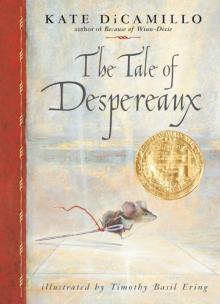 The Tale of Despereaux
The Tale of Despereaux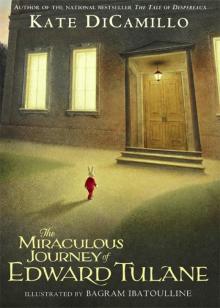 The Miraculous Journey of Edward Tulane
The Miraculous Journey of Edward Tulane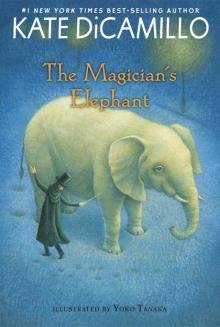 The Magician's Elephant
The Magician's Elephant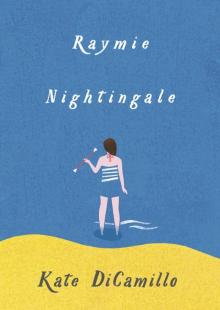 Raymie Nightingale
Raymie Nightingale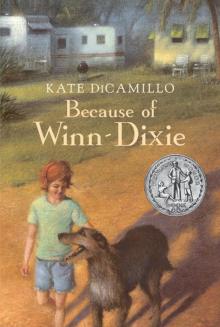 Because of Winn-Dixie
Because of Winn-Dixie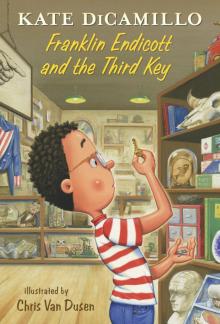 Franklin Endicott and the Third Key
Franklin Endicott and the Third Key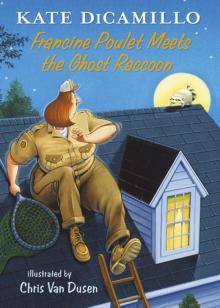 Francine Poulet Meets the Ghost Raccoon
Francine Poulet Meets the Ghost Raccoon Where Are You Going, Baby Lincoln?
Where Are You Going, Baby Lincoln?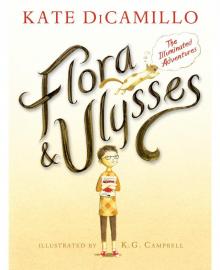 Flora & Ulysses: The Illuminated Adventures
Flora & Ulysses: The Illuminated Adventures Beverly, Right Here
Beverly, Right Here Eugenia Lincoln and the Unexpected Package
Eugenia Lincoln and the Unexpected Package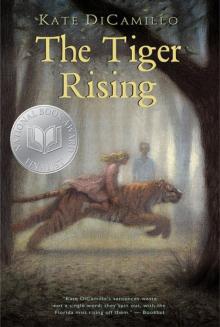 The Tiger Rising
The Tiger Rising The Beatryce Prophecy
The Beatryce Prophecy Leroy Ninker Saddles Up
Leroy Ninker Saddles Up